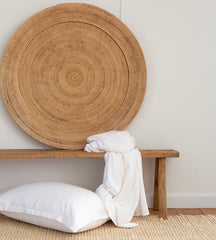
We sleep on average about seven hours a night, which means that we spend way more time in our bedroom than we do in any other room in the house. It would mean then if your sleeping space is dusty, stuffy, or generally unclean, how can you expect to sleep well?
Here are a few essentials I put in place to make my bedroom a healthier space...and better for restful sleep.
Start with the basics:
Take a peek under the bed. Is it clean or dusty? It's easy to forget about sweeping and vacuuming under the bed. It’s good practice to do it periodically, at least once a season. We should pull out all the storage bins, wipe them down, and clean the floor under your bed. If you suffer from sinus headaches and allergies, you may need to do this more often. Keep your bedroom as dust free as possible, dust mites are a huge cause of allergies, and this is detrimental to restful sleep.
Don’t forget to keep your bedroom well ventilated and allow the sunlight and fresh air in during the day.
Consider your Sheets & Pillowslips:
Are your sheets and pillowcases made from natural fibers? Consider buying bedlinen made from natural fabrics like, bamboo or bamboo cotton. They absorb moisture, are hypoallergenic and antimicrobial, perfect for sleeping.
How often do you change the sheets on your bed? Ideally, your sheets should be washed once a week. I definitely don’t wash my sheets that often, but if you suffer from allergies and sinus headaches try to stick to a once-a-week schedule and see if you notice an improvement in how you feel when you wake up.
Rethink your pillows:
When you sleep, you are literally breathing in your pillow for about 7 hours a night. It's a good idea to wash pillows at least twice per year. You can probably wash your pillows in the washing machine. This will freshen up your pillows as well as destroy any dust mites lurking in your pillows.
Also check to see what your pillows are filled with; many people are allergic to down, so instead consider a natural, hypoallergenic filling like wool, Bamboo, or memory foam. Or invest in hypoallergenic pillow covers
At the core of the matter:
The best mattresses for allergies, asthma and other similar conditions are ones made from natural materials like cotton, bamboo, or wool. If you already have a mattress and you're not in the market for a new one, you can invest in a hypoallergenic mattress cover to help keep yourself away from any triggering materials, as well as things like dust mites and mold. You should also get into the practice of cleaning your mattress with a vacuum a few times a year, at least.
Keep pets out of your bedroom:
Lastly, as much as it breaks my heart to say it, keeping pets away from your bed can be a critical step in keeping a bedroom bug free, especially if you struggle with allergies. If you can not resist having your pet in the bedroom, you will need to clean, dust and vacuum your bedroom more often. Washing your pet more often can also help with keeping your allergies under control.
I hope with these simple tips you can get better sleep!





Leave a comment